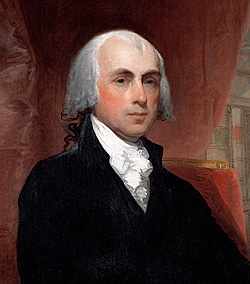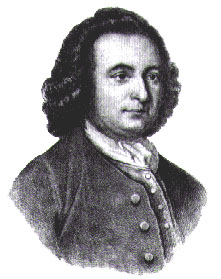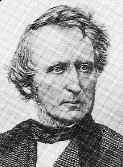"
But they didn’t focus on Vattel. They focused far more on Blackstone and English common law."
The father of the Constitution
The father of the Bill of Rights and the
The father of the 14th Amendment would all disagree with your opinion:

James Madison wrote to George Washington, N. York Octr. 18. 1787:
"Since the Revolution every State has made great inroads & with great propriety in many instances on this monarchical code.[Edit: Englands "Common Law"] The "revisal of the laws" by a Committe of wch. Col. Mason was a member, though not an acting one, abounds with such innovations. The abolition of the right of primogeniture, which I am sure Col. Mason does not disapprove, falls under this head.. What could the Convention have done? If they had in general terms declared the Common law to be in force, they would have broken in upon the legal Code of every State in the most material points: they wd. have done more, they would have brought over from G.B. a thousand heterogeneous & anti-republican doctrines, and even the ecclesiastical Hierarchy itself, for that is a part of the Common law."

George Mason, In Convention, Richmond (Debates in the Several State Conventions on the Adoption of the Federal Constitution), Wednesday, June 18, 1788:
"We have it in our power to secure our liberties and happiness on the most unshaken, firm, and permanent basis. We can establish what government we please. But by that paper we are consolidating the United States into one great government, and trusting to constructive security. You will find no such thing in the English government. The common law of England is not the common law of these states."
 |
| John Bingham, "father of the 14th Amendment", the abolitionist congressman from Ohio who prosecuted Lincoln's assassins, reaffirmed the definition known to the framers, not once, but twice during Congressional discussions of Citizenship pertaining to the upcoming 14th Amendment and a 3rd time nearly 4 years after the 14th was adopted.The House of Representatives definition for "natural born Citizen" was read into the Congressional Record during the Civil War, without contest! "All from other lands, who by the terms of [congressional] laws and a compliance with their provisions become naturalized, are adopted citizens of the United States; all other persons born within the Republic, of parents owing allegiance to no other sovereignty, are natural born citizens. Gentleman can find no exception to this statement touching natural-born citizens except what is said in the Constitution relating to Indians." (Cong. Globe, 37th, 2nd Sess., 1639 (1862)). The House of Representatives definition for "natural born Citizen" was read into the Congressional Record after the Civil War, without contest! “every human being born within the jurisdiction of the United States of parents not owing allegiance to any foreign sovereignty is, in the language of your Constitution itself, a natural born citizen.” (Cong. Globe, 39th, 1st Sess., 1291 (1866))"
|
| No other Representative ever took issue with these words on the floor of the House. If you read the Congressional Globe to study these debates, you will see that many of the underlying issues were hotly contested. However, Bingham’s definition of “natural born citizen” (born of citizen parents in the sovereign territory of the U.S.) was never challenged on the floor of the House. Without a challenge on the definition, it appears the ALL where in agreement.
|
Then, during a debate (see pg. 2791) on April 25, 1872 regarding a certain Dr. Houard, who had been incarcerated in Spain, the issue was raised on the floor of the House of Representatives as to whether the man was a US citizen (generally. they were not trying to decide if he was a NBC). Representative Bingham (of Ohio), stated on the floor:
“As to the question of citizenship I am willing to resolve all doubts in favor of a citizen of the United States. That Dr. Houard is a natural-born citizen of the United States there is not room for the shadow of a doubt. He was born of naturalized parents within the jurisdiction of the United States, and by the express words of the Constitution, as amended to-day, he is declared to all the world to be a citizen of the United States by birth.”
(The term “to-day”, as used by Bingham, means “to date”. Obviously, the Constitution had not been amended on April 25, 1872. And, since they knew he was, without a doubt, a natural born Citizen...he was, of course, considered a citizen of the U.S.)
|
|
The take away from this is that, while the debates and discussions went on for years in the people's house regarding "citizenship" and the 14th Amendment, not a single Congressman disagreed with the primary architect's multiple statements on who is a natural born Citizen per the Constitution. The United States House was in complete agreement at the time. NBC = born in sovereign U.S. territory, to 2 citizen parentS who owe allegiance to no other country. |
|
Furthermore, had they continued to use the laws of the crown, there never would have been a Deceleration of Independence.
English common law at the time didn't allow for "quitting" the crown. The Law of Nations, however, did allow for that. They clearly began their transition from the crown's law to that of their own (American common law) based in large part on natural law principles.
Of
course they couldn't simply adopt the whole of English common law.
The part that was inconsistent with the new Republic, they quite rightly threw away.
But on the whole, our cultural and legal heritage stemmed from Great Britain, and not from the Swiss and French world.
Given our vast heritage as long-standing colonies of Great Britain, and the fact (as I posted on another thread) that 85% of our white population (the non-whites were chiefly Indians and slaves) at the time of independence came from Great Britain, whereas something fewer than 3% of the population came from France, Switzerland, etc., it doesn't even make sense to argue that our legal system derived from Vattel rather than Blackstone unless you can produce the quotes to prove it.
And as far as I can see, nobody can.
As far as the quotes go, they're good quotes. But...
Madison also said that place of birth was what applied in regard to citizenship in the United States. He could've chosen to quote Vattel, but he didn't.
Mason's quote does not reflect a wholesale rejection of the common law heritage (why would we throw the baby out with the bath water?).
And Bingham's quotes are very curious indeed. For if what he really meant was citizens, then why didn't he use the term? It's certainly a whole lot less of a mouthful than "owing allegiance to no other sovereignty." Surely by the time of the Civil War, we had citizens.
In fact, earlier speakers used the term citizen dating from the Revolution - close to a century before Bingham's time.
And when you talk about US citizens, do you say "US citizen" - or do you say "a person owing allegiance to no other sovereignty?"


